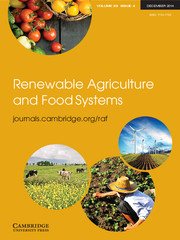Article contents
To each their own: case studies of four successful, small-scale organic vegetable farmers with distinct weed management strategies
Published online by Cambridge University Press: 28 November 2017
Abstract
Organic vegetable farmers execute weed management using many overall philosophies, including focusing management during the early-season critical period, managing the weed seedbank with a ‘zero seed rain’ strategy, or physically suppressing weeds with plastic or natural mulches. While these strategies vary in their ecological and economic implications, farmers’ reasons for adopting specific weed management approaches, and the related practical implications of each approach remain unclear. To better understand farmer motivations and ecological impacts of broad weed management philosophies, we conducted case studies of four successful organic vegetable farmers with specialization in different management approaches. The farmers were interviewed about their experiences and soil samples were collected for weed community and soil organic matter (SOM) analysis. The farmer who controls weed seedlings primarily during the critical period has appreciated the associated weeding labor savings, but late-season weeds have contributed to a large weed seedbank (38,482 seeds m−2), which is necessitating a change in his management. Conversely, the zero seed rain strategy of another farmer required a large amount of labor in the initial years, but weeding labor requirements have lessened every year due to decreased weed emergence from his diminishing weed seedbank (3065 seeds m−2). Another farmer utilizes plastic mulch in many crops in order to reduce weeding labor during the busy spring planting season. Finally, the farmer that uses natural mulches has high labor costs, but they are offset by the benefits of weed suppression, soil moisture conservation and increases to SOM. The two farmers utilizing mulch had the greatest portion of monocotyledonous weeds, perhaps relating to their morphology allowing them to emerge through the mulch. In ranking management criteria based on their importance, the case study farmers generally valued the criteria that are benefited by their strategy, indicating a strong relationship between their priorities and their management. Overall, there was no ‘best’ weed management strategy, but farmers may benefit from the consideration of how their management priorities match the practical tradeoffs of each strategy.
- Type
- Preliminary Report
- Information
- Copyright
- Copyright © Cambridge University Press 2017
References
- 5
- Cited by


